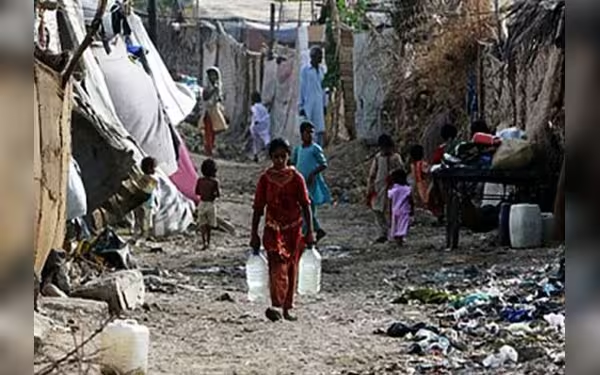Thursday, November 21, 2024 12:24 PM
Empowering Farmers in Pakistan to Combat Poverty
- Farmers face debt and fluctuating market prices.
- Kissan Card enhances farmers' productivity and income.
- Youth Program supports entrepreneurship and female empowerment.
 Image Credits: dailytimes_pk
Image Credits: dailytimes_pkExplore how initiatives like Kissan Card and Youth Program empower farmers and youth to combat poverty in Pakistan.
Poverty remains a significant challenge in Pakistan, affecting millions of families and hindering the nation’s economic growth. The plight of farmers, who form the backbone of the agricultural sector, is particularly concerning. These hardworking individuals often find themselves trapped in a cycle of debt and despair, struggling to make ends meet while facing the harsh realities of fluctuating market prices.
Take the case of Abdul Hakeem, a farmer who embodies the struggles faced by many in the agricultural community. With wrinkles etched on his face and worries about providing for his family, he prepares his land for sowing wheat, hoping for a better yield and price this season. His previous experience, where he suffered losses due to plummeting wheat prices, continues to haunt him. "Decades after decades, the same phenomenon goes on. Every year we borrow inputs from commission agents at the grain market, toil hard across the year but unfortunately suffer losses due to lesser prices of our commodities," he lamented.
Hakeem’s story is not unique. Approximately 70 percent of the labor force in Pakistan is linked to agriculture and livestock, making it a vital sector for the country’s economy. However, the policies governing this sector often fail to protect the interests of small farmers. Khalid Mahmood Khokhar, Chairman of Pakistan Kissan Ittehad, emphasized the need for a fair mechanism and an Independent Agriculture Commission to ensure that farmers receive fair rates for their crops. He stated, "If farmers remain poor, the dream to alleviate poverty will never come true."
Addressing poverty requires targeted efforts, including policies that empower the economically vulnerable. The Punjab government has initiated several projects aimed at alleviating the hardships faced by farmers. One such initiative is the Kissan Card, which functions like a debit card, allowing registered farmers to purchase agricultural inputs up to Rs 150,000 per season. Rashid Sindhu from the agriculture department explained that this program is transformative, enabling farmers to acquire necessary inputs at government-recommended prices, thereby increasing their productivity and income.
In addition to the Kissan Card, the government offers subsidies for advanced farming equipment, which helps farmers operate more efficiently. For those involved in livestock farming, the Livestock Card provides access to interest-free loans for essential animal feed and health products. Dr. Jamshaid Akhtar, Deputy Director of the Livestock Department, remarked, "Livestock Card is another initiative of the government for farmers’ empowerment and poverty alleviation." This initiative is crucial for ensuring that livestock farmers can maintain healthy animals and secure better prices in the market.
Moreover, the Prime Minister’s Youth Program is another significant effort aimed at empowering the younger generation. This program has disbursed Rs 186 billion to 790,000 entrepreneurs, providing financial assistance to both male and female youth to start their businesses. Rana Mashhood Ahmed Khan, Chairman of the Youth Program, highlighted the success of this initiative, stating that it aims to increase the percentage of female entrepreneurs receiving loans from 13 percent to 33 percent.
While poverty remains a daunting challenge in Pakistan, initiatives like the Kissan Card, Livestock Card, and the Prime Minister’s Youth Program offer hope for a brighter future. By empowering farmers and the youth, the government is taking essential steps towards alleviating poverty and fostering economic growth. It is crucial for policymakers to continue focusing on these initiatives, ensuring that the backbone of the economy—the farmers—receive the support they need to thrive. Only then can we hope to break the cycle of poverty that has persisted for generations.













